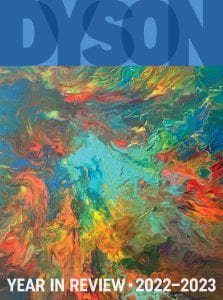
From the psychological effects of social distancing to the economic impact of the COVID-19 crisis, the Dyson College community is working to advance our understanding of the ongoing pandemic. Student, faculty, and alumni researchers are working on a wide range of projects with both immediate relevance and long-term implication that will enable the world to move forward.
Mental health
Associate Clinical Professor Linda Escobar Olszewski, PsyD, is studying the effects of the pandemic on the psychological well-being on one specific student group: athletes.
Barbara Mowder, PhD, is looking at another group: parents. With the onset of the COVID-19 pandemic, Mowder began working with several doctor of psychology candidates in the School- Clinical Child Psychology program to assess the efficacy of the Working with Parents Manual and the ways in which the virus may be impacting parents and parenting.
Tracking COVID-19 mutations
Valerie Patritti ’20, MS in Biochemistry and Molecular Biology, a fellow of the Association of Public Health Laboratories, together with the US Centers for Disease Control and Prevention, is analyzing the genetic code of SARS-CoV-2 genomes to decipher the genetic code of individual virus samples in New York City and determine if SARS-CoV-2 is changing through genetic mutation, with the goal of using the information to help with surveillance and contact tracing efforts.
The effects of
remote work
Public Administration Chair Gina Scutelnicu, PhD, has co-authored a paper analyzing how telework is impacting government workers. The research looked at how successful the transition to forced telework has been for federal employees during the COVID-19 crisis and how working experiences and arrangements adopted during COVID-19 may affect the future of telework.
Clinical Assistant Professor Ric Kolenda, PhD, is looking at how the COVID-19 pandemic has affected gig workers. In addition to providing a better understanding of conditions for gig workers during the pandemic, he hopes his current research will help identify creative solutions to the unique issues they’re facing.
Economic ramifications
Julieth Saenz Molina ’15, Economics, co-authored a report for the Federal Reserve Bank of Philadelphia looking at how a trend, seen during the Great Recession of 2008, that workers in occupations that could be easily automated by mechanization or technology experienced job losses in greater numbers, is occurring now as a result of the pandemic.

